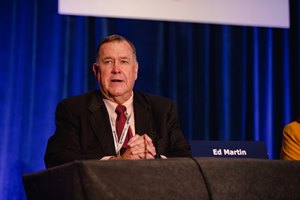HISA Officials: Be Wary of Assumptions About Rules


The proposed rules for safety and medication being considered by the Horseracing Integrity and Safety Authority remain very much in flux and industry stakeholders should not assume anything about what the organization board might eventually decide, representatives told regulators Dec. 9.
HISA consultant Tom DiPasquale and counsel John Roche answered questions during the final hour of an afternoon-long meeting of the Draft Rules Committee of the Association of Racing Commissioners International. They frequently cited lingering uncertainty about the current state of draft language or its ultimate fate before the HISA board or the controlling Federal Trade Commission.
Regulators represented on the ARCI committee also were stymied in efforts to determine the cost of HISA control over the industry or how those costs will be allocated among racing participants.
HISA was established by Congress to assume regulatory authority over horse racing in the United States—duties currently carried out by state racing commissions. Draft racetrack safety rules have been submitted to the board. Rules regarding medication are due before the end of the year. Cost considerations will be addressed during 2022, the HISA representatives said.
"You all know that this process typically takes a year or two," DiPasquale said. "That's the average time for federal rulemaking. And it was squeezed into a few months. So what we have in front of us now is an imperfect rule but it can be made significantly better over the 60-day comment period."
He also urged the committee to "be careful about making assumptions about what the HISA Board is going to do. They're nine very talented, smart people who are independent-minded and will make their own judgments about whether what is proposed from the advisory committees ... is in the best interest of racing."
The fragmentation of the process makes meaningful comment difficult, ARCI president Ed Martin said.
"There's a lot of people who've expressed to me a concern that the entire program is not being submitted and it's hard to comment on a piece, especially if you don't know what the ultimate costs are, and there obviously are options of how to do things," Martin said.
"With all due respect to the HISA board, it's kind of hard for people to get their arms around this without understanding the whole program and then what the potential cost is and how it's proposed to be paid for."
"I totally understand your point," Roche said. "But, I mean, I wish I had another year, too."
Martin also criticized the surprise announcement a day earlier by HISA chairman Charles Scheeler that testing will be phased in with local regulators expected to continue collecting and testing race-day samples through 2022.
"As I understand it, that is something that is a matter of negotiation between the states and the enforcement agency," Martin said, noting HISA has not yet contracted with an enforcement agency. "That's not something you can just make blanket announcements without those negotiations.
"We were shocked that an announcement like that would be made in a public forum the way it was. We were absolutely shocked ... We're open to figuring this out with you. We're open to partnering with you. And that's going to be an individual state decision. But to make a blanket decision and assume that racing activity is going to continue in the absence of those agreements, is quite an assumption."
In other action, the committee tabled for further consideration a proposal to amend its model rules to extend from 24 hours to 48 hours the exclusion period for administration of medication and establishment of a "grace period" for reported medication violations associated with laboratory changes or changes in screening methodology.
The committee did advance a proposed model rules change involving the use of Thyroxin, a drug intended to be used for the treatment of hypothyroidism. The proposal would limit the administration of the drug to horses diagnosed with that condition through the Thyrotropin Releasing Hormone Response Test.
A proposal to significantly redraft the ARCI model rules concerning multi-race wagering pools was withdrawn for further input and deliberation.
